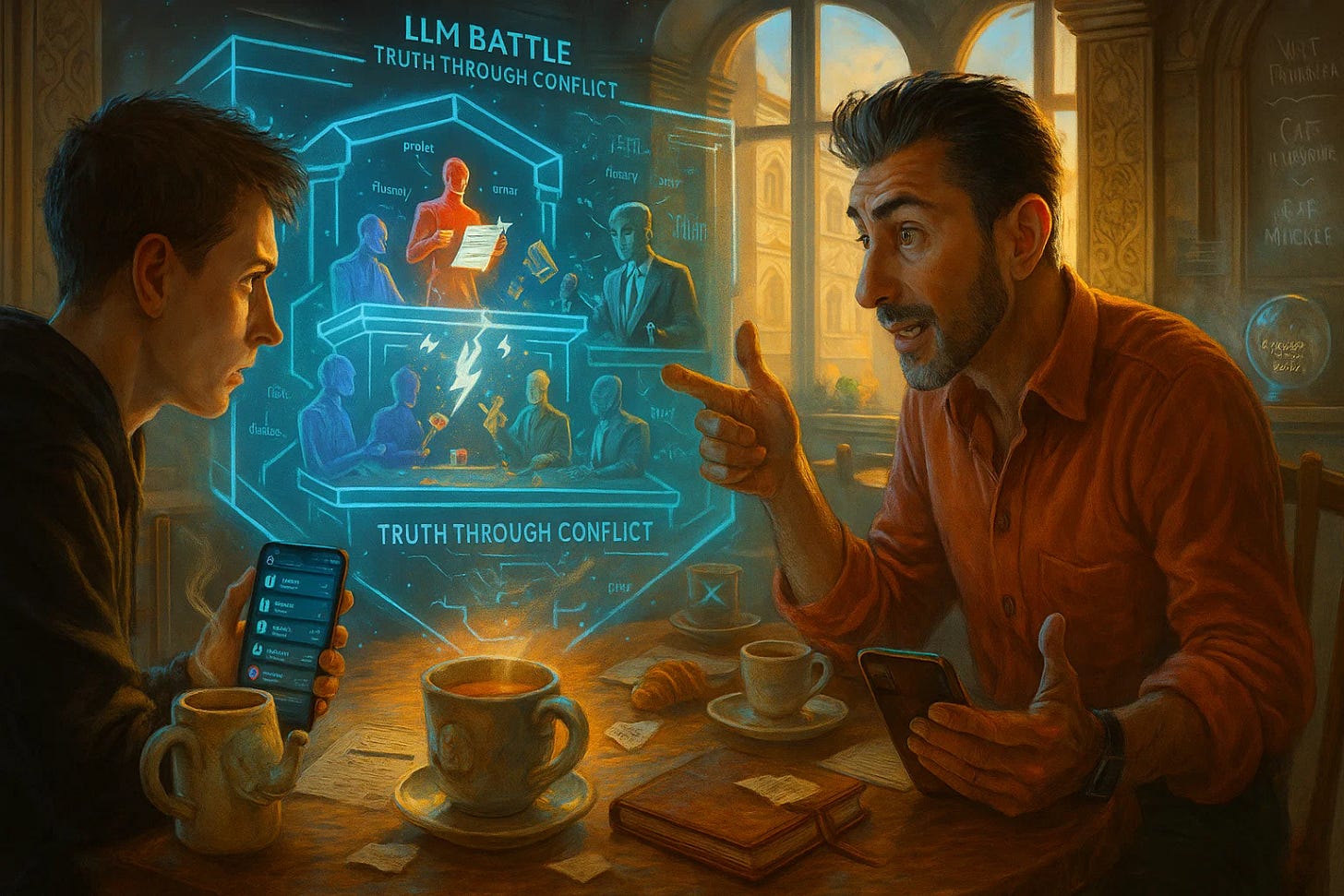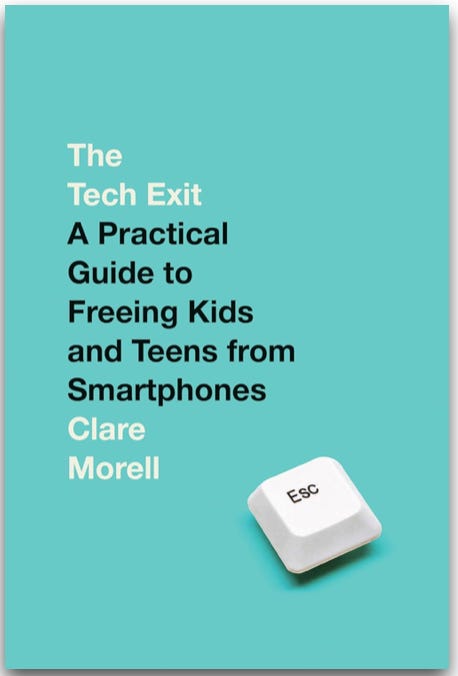A Few of Today's Reads (Tuesday, June 17, 2025)
The Global Retail Revolution / The Midnight Code Duel
What's Happening Today: Tuesday, El Salvador Día del Padre, Iceland Independence Day & World Day to Combat Desertification and Drought expected earnings from La-Z-Boy, Uranium Energy, Jabil Circuit and Ashtead Group
• EXCLUSIVE - The Global Retail Revolution / How Chick-fil-A, Costco, and Others Redefine Success: Walk into a Costco in Tokyo or line up for a Chick-fil-A sandwich in Dubai, and you’re not just a customer—you’re part of a carefully crafted experience. These brands—Chick-fil-A, Costco, Starbucks, Ikea, Crocs, Dollar General, Sephora, Target, Airbnb, and Home Depot—don’t just sell products; they shape lifestyles and build loyalty that spans continents. Their success hinges on a blend of psychology, data, and cultural adaptability, turning everyday transactions into global movements. (Ken Rutkowski)
• Social Media Surpasses TV as Top US News Source: Social media, led by platforms like X and YouTube, now delivers news to 54% of Americans, outpacing TV’s 50%, per Reuters Institute. “Changes are happening faster” in the US, says Nic Newman, as influencers like Joe Rogan, seen by 22%, reshape how news reaches audiences. (BBC)
• AI Pioneers Debate Posthuman Future at Symposium: Top AI minds convened in San Francisco to envision a "posthuman transition," where superhuman AI could inherit humanity’s mantle, with organizer Daniel Faggella urging a slowdown to ensure ethical progress. “This is an advocacy group for slowing down AI progress,” he said, amid debates on universal values and risks. (Futurism)
• EXCLUSIVE - The Midnight Code Duel: When I Made Two AIs Battle for My Soul: I was burning the midnight oil to build something bigger: a new community to ignite entrepreneurship and to guide dreamers through starting, growing, and funding their businesses. I needed to crack LinkedIn’s code to amplify my voice and rally founders to this cause. I’m no tech wizard: just a guy with curiosity, caffeine, and a mission to spark a movement. (Ken Rutkowski)
• Smarter Brains Sync Theta Waves for Sharp Focus: Smarter individuals excel at synchronizing midfrontal theta waves during decision-making, boosting cognitive control, a Mainz University study reveals. “Specific signals are better synchronized in people with higher cognitive ability,” says Professor Anna-Lena Schubert, unveiling the brain’s dynamic rhythm as a key to intelligence. (Sciencedaily)
• Scientists Release Mosquitoes to Save Hawaii’s Birds: Birds, Not Mosquitoes drops 40 million male mosquitoes carrying Wolbachia to curb avian malaria decimating Hawaii’s honeycreepers, with 17 species left. “It’s a plan to kill off the mosquito population through breeding,” targeting invasive pests without harming ecosystems, as drones now aid delivery. (BGR)
• Music Rewires Brain Networks in Real Time: A groundbreaking study reveals music doesn’t just entertain—it reshapes your brain, with networks syncing to rhythms in real time, as shown by the FREQ-NESS method. “The brain doesn’t just react, it reconfigures,” says Professor Leonardo Bonetti, unveiling a dynamic dance of brainwaves. (The Brighterside)
• AI Autonomous Agents Dominate 2025 Seed Funding: Investors poured $700 million into seed-stage startups developing autonomous AI agents, signaling a shift toward self-operating enterprise tools. “It’s the next evolution of doing work,” says Terrence Rohan, as these agents tackle logical tasks from legal tech to coding. (Crunchbase)
• Mandela Effect Reveals Shared False Memories: The Mandela Effect, where groups misremember details like the Monopoly Man’s monocle, sparks psychological intrigue, with research showing seven of 40 images consistently trigger false memories. “It’s pretty amazing how our brains build vivid memories of images that don’t exist,” says researcher Wilma Bainbridge. (Cosmos)
• Navigate Pet Travel with These Essential Tips: Flying with pets demands meticulous planning, with 56% of U.S. pet owners traveling less due to complex airline rules, like $150 fees and strict carrier sizes. From vet-signed health certificates to TSA screenings, these tips ensure a smooth journey for your furry friend. (Kiplinger)
• Copenhagen Overtakes Vienna as Most Liveable City: Copenhagen seized the 2025 Global Liveability Index crown, scoring perfect marks in stability, education, and infrastructure, while Vienna slipped to second amid stability concerns. “Pressure on stability has led Vienna to lose its position,” says Barsali Bhattacharyya, as global unrest challenges urban quality of life. (Economist)
• Tech Giants Bet Big on AI Smart Glasses: Tech titans like Snap, Meta, and Google are racing to launch AI-powered smart glasses by 2026, with the market projected to soar from 3.3 million units in 2024 to 13 million. “AI is making these devices easier to use,” says analyst Jitesh Ubrani, promising a revolution beyond smartphones. (CNN)
• Louvre Staff Strike Shuts Museum, Protests Overtourism: The Louvre closed abruptly as staff struck, overwhelmed by 8.7 million annual visitors, protesting unmanageable crowds and crumbling infrastructure. “It’s the Mona Lisa moan out here,” said a stranded tourist, capturing the chaos of a cultural icon at its breaking point. (AP)
• News Overwhelms: Why People Tune Out Media: Forty percent of people globally avoid news, citing its negative impact on mood, with war and politics dominating coverage, per Statista’s chart. This surge from 29% in 2017 reveals a growing desire for mental respite amid relentless global crises. (Statista)
• Master DIY Projects with Smart Budgeting: Discover seven savvy budgeting hacks to conquer DIY projects without breaking the bank. From reclaiming materials to phasing execution, these tips, backed by the fact that 29% of Americans face unmanageable debt, ensure you finish strong and stress-free. (Qz)
• Microsoft, OpenAI Clash Over Windsurf IP Access: Microsoft and OpenAI’s partnership frays as OpenAI’s $3 billion Windsurf acquisition sparks fierce negotiations over intellectual property access. “We have a long-term, productive partnership,” both claim, yet OpenAI’s antitrust threats signal a high-stakes battle reshaping AI’s future. (Axios)
• Light Pierces Human Skull in Breakthrough Scan: Physicists achieved a medical first, detecting light transmitted 15.5 cm through a human skull, unlocking deep-brain imaging potential. With one photon detected per second after 30 minutes, this laser-driven feat could transform non-invasive diagnostics, though challenges like long scan times remain. (The Debrief)
• Curiosity’s Photo Sparks Martian Mushroom Speculation: A 2013 Curiosity rover photo reveals a mushroom-like rock on Mars, fueling alien life theories, though scientists attribute it to geological concretions. “This is just a disc-shaped rock atop a smaller stone,” says Dr. Gareth Dorrian, dismissing claims of fungal life in Mars’ harsh environment. (DailyMail)
• Quiz Unveils Your Relationship’s True Health: Seven probing questions from Stockholm University’s Valentine Scale reveal your relationship’s vitality, assessing teamwork, trust, and emotional closeness. “This scale quickly shows how a relationship is doing,” says Professor Per Carlbring, offering a tool to spark growth or intervention. (Vice)
• Today's Photo, Image, or Video of the Day: France's new parliament opens with tensions as far-left MPs snub handshake with 22-year-old far-right MP Flavien Termet.
• Notable Statistic: Gasoline prices (liter, U.S. Dollar)
• YouTube Worth Watching: How Boba Shops Really Make Money
• Ken's Book Pick: The Tech Exit: A Practical Guide to Freeing Kids and Teens from Smartphones
• Ken's Website / Tool: Needs to Exist is a daily newsletter dedicated to sharing innovative startup ideas that are ripe for development. Each day, subscribers receive a fresh, actionable idea that addresses unmet needs or untapped opportunities in the market. In addition to the daily insights, subscribers can access a comprehensive database of over 3,000 curated ideas, offering a wealth of inspiration for entrepreneurs, creators, and innovators.
Infidelity in America: State-by-State Breakdown
This report presents the findings of a nationwide survey conducted by NapLab, which asked 1,649 Americans about their experiences with infidelity. Respondents were asked whether they had cheated on a significant other, been cheated on, or both. The results are displayed by U.S. state and highlight geographic trends in relationship fidelity.
National Averages
Cheated on by a partner: 84.71%
Have cheated on a partner: 34.22%
Either cheated or been cheated on: 88.71%
States with the Highest Rates of Cheating
Top 10 states where people are most likely to have cheated on a partner:
Hawaii – 80.56%
Louisiana – 62.50%
Rhode Island – 62.50%
Delaware – 58.33%
Wyoming – 50.00%
New Hampshire – 50.00%
Maine – 46.67%
North Carolina – 44.44%
New Mexico – 41.94%
Utah – 41.94%
States with the Highest Rates of Being Cheated On
Top 10 states where people are most likely to have been cheated on:
Kentucky – 97.06%
Alaska – 97.06%
Maryland – 96.67%
North Carolina – 94.44%
North Dakota – 94.44%
Michigan – 93.94%
West Virginia – 93.55%
Oklahoma – 93.55%
Maine – 93.55%
South Carolina – 91.67%
States with the Most Total Infidelity (Cheated or Been Cheated On)
Top 10 states where people are most likely to have either cheated or been cheated on:
North Carolina – 100%
Kentucky – 100%
Alaska – 100%
North Dakota – 97.22%
Delaware – 97.06%
Michigan – 96.97%
Louisiana – 96.88%
Maine – 96.67%
Maryland – 96.67%
Hawaii & South Carolina – 94.44%
States with the Fewest Total Infidelity Cases
Bottom 10 states with the lowest combined infidelity rates:
Connecticut – 73.33%
Indiana – 74.19%
Massachusetts – 74.29%
Vermont – 74.29%
New Jersey – 77.14%
Idaho – 77.14%
Illinois – 80.65%
Nebraska – 81.25%
Alabama – 81.25%
Kansas – 81.82%
Key Takeaways
North Carolina and Kentucky reported the highest combined rates of infidelity at 100%, meaning every respondent from those states had either cheated or been cheated on.
Connecticut reported the lowest rate at 73.33%, suggesting stronger relationship fidelity among its residents.
Hawaii leads the country in self-reported cheaters, with over 80% admitting to cheating.
High rates of cheating do not always correlate with high rates of being cheated on (e.g., Hawaii).














